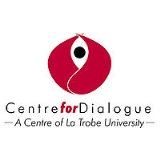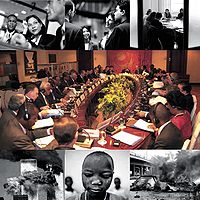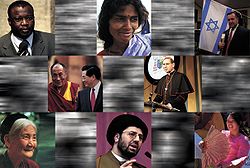
Centre for Dialogue
Encyclopedia
The Centre for Dialogue is an interdisciplinary research
institution at La Trobe University
. Professor Joseph Camilleri, a prominent academic figure in the study of International Relations
, is the director of the Centre. The research centre specialises in the philosophy, method and practice of dialogue
between communities, cultures, religions and civilisations. The key aims of the Centre include:
 The focus of the Centre is largely concentrated on inter-cultural, inter-religious conflict and inter-civilisational conflict, as well as the researching of practical methods of dialogue which may encourage peace
The focus of the Centre is largely concentrated on inter-cultural, inter-religious conflict and inter-civilisational conflict, as well as the researching of practical methods of dialogue which may encourage peace
ful resolutions
to conflict and mechanisms for cooperation
.
The Centre for Dialogue has several current ongoing projects which act as the hallmark of the institutions' study.
Examples of such ongoing projects are investigating the tensions relations to the role of religion and culture in international politics, particularly since the 11 September terrorist attacks. Such projects continue to focus on how the government
, nongovernment and civil society
sectors have responded, most notable in Europe
, the US, and Asia
(including Australia
). The projects investigate both domestic conflict (for example, strategies to curb escalating tensions between Muslims and non-Muslims) and international tensions (for example, the implications arising from the rise of Political Islam and the War on Terror
in international politics).
Other projects include:
The Centre for Dialogue also runs several educational programmes, such as the Muslim Leadership Program for Young Muslims which aims to empower young Muslim men and women and help them to reach their full potential as citizens and future leaders.
 The Centre for Dialogue composes and distributes publications arising from their diverse research projects. This includes the publication of books, edited volumes and journal articles, as well as discussion papers that are distributed to relevant organisations and government departments. The Centre also distributes a bi-annual newsletter that reports on the Centre’s activities, as well as includes opinion pieces on issues that relate to the Centre’s interests.
The Centre for Dialogue composes and distributes publications arising from their diverse research projects. This includes the publication of books, edited volumes and journal articles, as well as discussion papers that are distributed to relevant organisations and government departments. The Centre also distributes a bi-annual newsletter that reports on the Centre’s activities, as well as includes opinion pieces on issues that relate to the Centre’s interests.
The Centre for Dialogue also distributes several working papers each year that do not necessarily relate to the Centre’s projects. Monograph
s are submitted to the Centre to be considered by the editorial committee for publication
. The intention of the Working Papers is to provide the research community (including students and academics), policy-makers, journalists and community leaders with an opportunity to contribute to ongoing debates. Papers are preferred to focus on the dynamics of conflict (whether intrastate, inter-state, or trans-state). They generally must also identify ways in which the theory and/or practice of dialogue has contributed to coexistence, co-operation and mutual enrichment and highlight methods that may foster peaceful relations in the future.
The Centre for Dialogue and its staff provide the core of the editorial input of the scholarly journal, Global Change, Peace and Security, published by Routledge and edited from La Trobe University.
Director, Professor Joseph Camilleri's most recent book, co-authored with Professor Jim Falk, was launched by UNDP head, the Hon Helen Clark, in Sydney, Australia in February 2010. The book "Worlds in Transition: Evolving Governance Across a Stressed Planet", Edward Elgar, UK, is a synoptic overview of the way in which humans have come to collectively seek to shape their futures, and the challenges posed to that in a time of rapid transition. More detail on this is available at worlds-in-transition.com
on 'Reconciliation: Two Centuries On, Is Dialogue Enough?'. Widely regarded as the ‘father of the reconciliation movement’, Dodson addressed key issues that he believed were hindering the reconciliation movement between Indigenous
and non-Indigenous Australians and advocated for the Howard
Australian government to engage in dialogue with Indigenous communities.
Research
Research can be defined as the scientific search for knowledge, or as any systematic investigation, to establish novel facts, solve new or existing problems, prove new ideas, or develop new theories, usually using a scientific method...
institution at La Trobe University
La Trobe University
La Trobe University is a multi-campus university in Victoria, Australia. It was established in 1964 by an Act of Parliament to become the third oldest university in the state of Victoria. The main campus of La Trobe is located in the Melbourne suburb of Bundoora; two other major campuses are...
. Professor Joseph Camilleri, a prominent academic figure in the study of International Relations
International relations
International relations is the study of relationships between countries, including the roles of states, inter-governmental organizations , international nongovernmental organizations , non-governmental organizations and multinational corporations...
, is the director of the Centre. The research centre specialises in the philosophy, method and practice of dialogue
Dialogue
Dialogue is a literary and theatrical form consisting of a written or spoken conversational exchange between two or more people....
between communities, cultures, religions and civilisations. The key aims of the Centre include:
- Educational projects designed to promote inter-cultural/inter-civilisational dialogue in schools and universities
- Research that addresses the challenges and opportunities presented by cultural, religious and political diversity and conflict
- Policy advice to governmental bodies, international agencies and non-governmental organisations
- Events, such as public forums, conferences, workshops, professional development days, courses, seminars consultations and media events
- Publications, such as working papers, books, articles, reports and media comment.
Projects of the Centre

Peace
Peace is a state of harmony characterized by the lack of violent conflict. Commonly understood as the absence of hostility, peace also suggests the existence of healthy or newly healed interpersonal or international relationships, prosperity in matters of social or economic welfare, the...
ful resolutions
Resolution (policy debate)
In policy debate, a resolution or topic is a normative statement which the affirmative team affirms and the negative team negates. Resolutions are selected annually by affiliated schools....
to conflict and mechanisms for cooperation
Cooperation
Cooperation or co-operation is the process of working or acting together. In its simplest form it involves things working in harmony, side by side, while in its more complicated forms, it can involve something as complex as the inner workings of a human being or even the social patterns of a...
.
The Centre for Dialogue has several current ongoing projects which act as the hallmark of the institutions' study.
Examples of such ongoing projects are investigating the tensions relations to the role of religion and culture in international politics, particularly since the 11 September terrorist attacks. Such projects continue to focus on how the government
Government
Government refers to the legislators, administrators, and arbitrators in the administrative bureaucracy who control a state at a given time, and to the system of government by which they are organized...
, nongovernment and civil society
Civil society
Civil society is composed of the totality of many voluntary social relationships, civic and social organizations, and institutions that form the basis of a functioning society, as distinct from the force-backed structures of a state , the commercial institutions of the market, and private criminal...
sectors have responded, most notable in Europe
Europe
Europe is, by convention, one of the world's seven continents. Comprising the westernmost peninsula of Eurasia, Europe is generally 'divided' from Asia to its east by the watershed divides of the Ural and Caucasus Mountains, the Ural River, the Caspian and Black Seas, and the waterways connecting...
, the US, and Asia
Asia
Asia is the world's largest and most populous continent, located primarily in the eastern and northern hemispheres. It covers 8.7% of the Earth's total surface area and with approximately 3.879 billion people, it hosts 60% of the world's current human population...
(including Australia
Australia
Australia , officially the Commonwealth of Australia, is a country in the Southern Hemisphere comprising the mainland of the Australian continent, the island of Tasmania, and numerous smaller islands in the Indian and Pacific Oceans. It is the world's sixth-largest country by total area...
). The projects investigate both domestic conflict (for example, strategies to curb escalating tensions between Muslims and non-Muslims) and international tensions (for example, the implications arising from the rise of Political Islam and the War on Terror
War on Terror
The War on Terror is a term commonly applied to an international military campaign led by the United States and the United Kingdom with the support of other North Atlantic Treaty Organisation as well as non-NATO countries...
in international politics).
Other projects include:
- The Education Dialogue Project, which has investigated ways that dialogue can enhance intercultural awareness and understanding in VictorianVictoria (Australia)Victoria is the second most populous state in Australia. Geographically the smallest mainland state, Victoria is bordered by New South Wales, South Australia, and Tasmania on Boundary Islet to the north, west and south respectively....
schools. - The Dialogue Diaspora Project which explores the nature of tensions between ethno-nationalist diasporicDiasporaA diaspora is "the movement, migration, or scattering of people away from an established or ancestral homeland" or "people dispersed by whatever cause to more than one location", or "people settled far from their ancestral homelands".The word has come to refer to historical mass-dispersions of...
communities in AustraliaAustraliaAustralia , officially the Commonwealth of Australia, is a country in the Southern Hemisphere comprising the mainland of the Australian continent, the island of Tasmania, and numerous smaller islands in the Indian and Pacific Oceans. It is the world's sixth-largest country by total area...
whose homelands are in conflict (for example, the Sri Lankan, Iraqi and Cypriot communities). The project examines the formation and transformation of such conflicts in Australia and explores practical dialogical methods to reduce their impact. - The Northern Interfaith Network which is developing a network of initiatives in Melbourne’sMelbourneMelbourne is the capital and most populous city in the state of Victoria, and the second most populous city in Australia. The Melbourne City Centre is the hub of the greater metropolitan area and the Census statistical division—of which "Melbourne" is the common name. As of June 2009, the greater...
culturally-diverse northern suburbs with five municipalities and seven organisations. It aims to provide government agencies (federal and state), religious and ethnic groups and community organisations with tested guidelines to facilitate community based dialogue initiatives.
The Centre for Dialogue also runs several educational programmes, such as the Muslim Leadership Program for Young Muslims which aims to empower young Muslim men and women and help them to reach their full potential as citizens and future leaders.
Publications

The Centre for Dialogue also distributes several working papers each year that do not necessarily relate to the Centre’s projects. Monograph
Monograph
A monograph is a work of writing upon a single subject, usually by a single author.It is often a scholarly essay or learned treatise, and may be released in the manner of a book or journal article. It is by definition a single document that forms a complete text in itself...
s are submitted to the Centre to be considered by the editorial committee for publication
Publication
To publish is to make content available to the public. While specific use of the term may vary among countries, it is usually applied to text, images, or other audio-visual content on any medium, including paper or electronic publishing forms such as websites, e-books, Compact Discs and MP3s...
. The intention of the Working Papers is to provide the research community (including students and academics), policy-makers, journalists and community leaders with an opportunity to contribute to ongoing debates. Papers are preferred to focus on the dynamics of conflict (whether intrastate, inter-state, or trans-state). They generally must also identify ways in which the theory and/or practice of dialogue has contributed to coexistence, co-operation and mutual enrichment and highlight methods that may foster peaceful relations in the future.
The Centre for Dialogue and its staff provide the core of the editorial input of the scholarly journal, Global Change, Peace and Security, published by Routledge and edited from La Trobe University.
Director, Professor Joseph Camilleri's most recent book, co-authored with Professor Jim Falk, was launched by UNDP head, the Hon Helen Clark, in Sydney, Australia in February 2010. The book "Worlds in Transition: Evolving Governance Across a Stressed Planet", Edward Elgar, UK, is a synoptic overview of the way in which humans have come to collectively seek to shape their futures, and the challenges posed to that in a time of rapid transition. More detail on this is available at worlds-in-transition.com
Events
The Centre for Dialogue hosts one major national or international conference and one major public lecture each year. In 2008, the Centre hosted an international conference titled ‘Europe and Asia: Between Islam and the United States’. The conference was cosponsored by seven research institutions, the Australian-French Embassy, the Polish Foreign Ministry and attracted 100 attendees (which included keynote speakers from around the world). The conference examined the policies and attitudes from a range of countries in Europe and Asia vis-à-vis the rise of political Islam on the one hand, and the implications of American policies on the other. The Centre’s public lecture was delivered by Patrick DodsonPatrick Dodson
Patrick Dodson is a Yawuru man from Broome, Western Australia, he is a former Chairman of the "Council for Aboriginal Reconciliation", a former Commissioner into Aboriginal Deaths in Custody and former Roman Catholic priest. He was the winner of the 2008 Sydney Peace Prize...
on 'Reconciliation: Two Centuries On, Is Dialogue Enough?'. Widely regarded as the ‘father of the reconciliation movement’, Dodson addressed key issues that he believed were hindering the reconciliation movement between Indigenous
Indigenous Australians
Indigenous Australians are the original inhabitants of the Australian continent and nearby islands. The Aboriginal Indigenous Australians migrated from the Indian continent around 75,000 to 100,000 years ago....
and non-Indigenous Australians and advocated for the Howard
John Howard
John Winston Howard AC, SSI, was the 25th Prime Minister of Australia, from 11 March 1996 to 3 December 2007. He was the second-longest serving Australian Prime Minister after Sir Robert Menzies....
Australian government to engage in dialogue with Indigenous communities.

